H.B. Berlow's Blog, page 8
March 23, 2024
GENRE/CUISINE
Throughout the history of this blog, I have made numerous references to cooking in all its wondrous forms. Baking, sausage making, new recipes, old recipes, cookware, kitchen remodels, etc. However, I assure you, those comments are not analogies to the craft of writing. For me, there are but two primary modes of self-expression: cooking and writing. They go hand in hand in terms of ingredients (or writing tools), research, process, and the ultimate satisfaction.
What I find most unique is the comparison between genre and cuisine. Those are symbiotic concepts within the scope of each tradition. In my life, I have written short stories, poetry, screenplays, short plays, and fiction of all kinds. I have enjoyed a variety of food styles from Mexican to Asian, Mediterranean to Italian, and anything else that I could find that would be both flavorful and healthy.
I suppose you get to a point where you might have to make hard decisions. Do I continue within one genre? Do I gather a list of 25 or 50 recipes and stick to them? Do I read more of one genre? Do I purge kitchen implements used largely for one thing? Or, on the contrary, do I expand myself to a time when exploration was about learning and now it is about refining?
My wife will often reference a recipe that I hadn’t made in a long time. This is only because after nearly 30 years together, I have expanded my repertoire so now there is a lot more from the past. When I was in Boston from the early to mid-1990s, I could hardly consider any form of fiction as I was so ingratiated in the world of poetry. I absorbed Greek and Roman poetry, the early 20th century Europeans and the mid-century Americans. I haven’t written a poem in years.
Your mind might fall onto a notion out of the blue. An encounter with a friend at a writers conference encourages you to think about writing a one-act play because, well, you used to do that in your early 20s. Entering a contest for Flash Fiction is enough motivation to delve into that highly restrictive form to see what you’re capable of doing.
That winds up being nothing more than using the stand mixer versus the hand mixer, the saucepan instead of the double boiler. No, what we tend to avoid is a completely different genre. For the past nine years, I have been blessed to fall into writing historical crime fiction. It took some time to develop the sense of research and verbiage necessary in order to craft stories of significance, excitement, and entertainment. It’s like the ground chicken breakfast sausage patties I’ve been making for years. I have a strong feeling toward the process and simply focus on completion.
Perhaps I have no desire to write sci-fi, fantasy, or romance. What about literary fiction? What about a deep human story that involves morality and emotional conflict that does not include any crime? How about returning to poetry, short or epic, rhymed or free verse? Do I have the capacity to switch gears, so to speak, after being comfortable in one genre for so long?
The other side to the inquiry relates not to ability but to desire. Do I want to explore other genres, other cuisines? Is it necessary? The answer to that will come at a point in the journey of both when the processes seem to become rote, when the joy of creation becomes nothing more than a structured process and the end product is the same every single time without a single variance.
Until that time, as long as I find complete and utter joy in what I do, I will continue on my path. Curiosity or boredom will lead me into new dimensions. I can assure you if that were to happen, I will follow.
March 11, 2024
OSCAR
I started “predicting” the Academy Awards back in 1976. A smug barely fourteen-year-old kid thought he could have a go at the top six categories. I honestly don’t recall who I picked but I’m sure I didn’t have Beatrice Straight on my scorecard for Best Supporting Actress.
The following year, in advance of the Fiftieth Anniversary, I sent a well-organized suggestion for a special to be held over five evenings, with each decade encompassing an evening. I went so far as to type up (and highlight with colored markers) the main categories, just in case they needed a reminder. I received a polite response indicating that something of the ilk was being planned. The letter came on the official letterhead of the Academy of Motion Picture Arts and Sciences, complete with an embossed gold Oscar. I still have it, somewhere, and treasure it, as much for my brash audacity as for the courteousness of the response.
I’ve only missed watching the show once since then. Although there was 2016 when I recorded the show via DVR on my satellite service, the show ran long, and by the time I figured out what was happening, it was too late to watch “Spotlight” take the top prize in an upset.
For the past several years, I have given up predicting. It took away from my focus of watching the show, enjoying the gathered film professionals, and fantasizing. Yes, I have long since dreamt of winning an Oscar. When I went to the University of Miami to study film-making, the fantasy was stoked beyond all imagination. My acceptance speech has changed dramatically. But, as of the last 29 years, the reference to my wife has been a centerpiece.
I marvel at all the discussions that take place about the show, its relevance in an evolving technological world where the movie experience has changed completely. Comments regarding who won, who didn’t win, who didn’t get nominated, all sound as though they are significant adjuncts to life itself. In the same breath, those commentators will reference the lack of significance these awards have. It seems to me if that were the case, all of the hoopla about the winners would be meaningless.
I couldn’t agree more.
The awards and the private foundation that supports it were never meant to be anything other than a sales and marketing tool. From a simple banquet to an event broadcast on the radio, and finally capturing a worldwide audience, it is a very long commercial for the producers of the film industry to declare “See, we have a wonderful product.”
I heard Vanessa Redgrave’s comments upon accepting her Best Supporting Actress Award for “Julia” and snickered at Paddy Chayefsky’s retort. Anyone could feel the shrieks when Jack Nicholson announced “Crash” had won Best Picture over “Brokeback Mountain”, not to mention his eye gesture as well. We had years when no one of color was nominated in the acting categories and the ongoing discussions about women directors. We have applied all manner of social commentary to a show that is the presentation of awards by a private foundation where the only relevance is held within its own walls.
I tune out all the chatter and that’s only because I am still holding on to my dream. That’s what allows me to watch while my head swims in an almost delusional grandeur. But I’m almost 62, have only published a handful of books, and don’t have many connections to the film industry while living in Wichita, Kansas. Yet, James Ivory was 89 when he won the Best Adapted Screenplay award for “Call Me By Your Name” and Woody Allen was 76 when he won the Best Original Screenplay award for “Midnight in Paris.”
I still have time.
March 2, 2024
A QUESTION OF TIME
I would love to have been a fly on the wall in some Parisian café in the 1920’s, listening to those renowned expatriates talk about writing. Hemingway boasting “I write every morning” or F. Scott Fitzgerald enumerating his seven tips on writing. From a more contemporary standpoint, Stephen King tries to write six pages a day while the late Susan Sontag told people not to call her in the morning. The lists are endless. They are perhaps motivational in nature, designed to help, in a clinical fashion, to avoid writer’s block, stagnation or boredom.
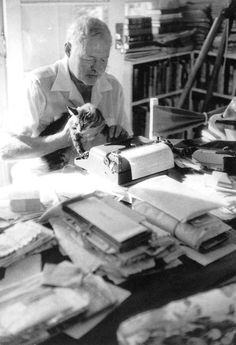
They are all a gigantic lie.
For once, I’d like to come across a writer of some repute talk about scooping cat litter or mowing the lawn, doing grocery shopping or just plain sitting down to pay the bills and balance the checkbook. Unless you are a phenomenally successful writer who has a maid and maintenance staff and eats out three meals a day, you are likely a schmo like me, a working-class stiff who has to do some of the aforementioned list while at the same time developing your sense of creativity, actually writing and editing, and then promoting your works.
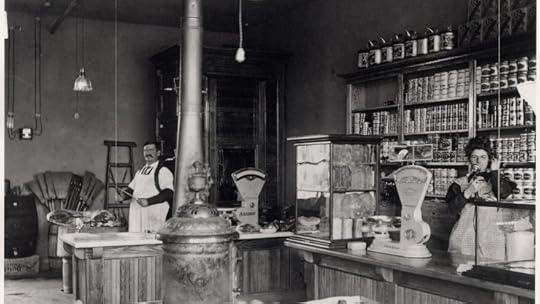
Years ago, I worked with another writer who was twenty years younger. He often bemoaned not having enough time to write. In one regard, I could empathize. He, however, lived in an apartment, had the second of three girlfriends (in the span of time I worked with him), and stayed up all night playing online fantasy role-playing games. Meanwhile, I was a married homeowner who had two books published.
Time is an omnipotent creature that can not be overcome. But it can be managed.
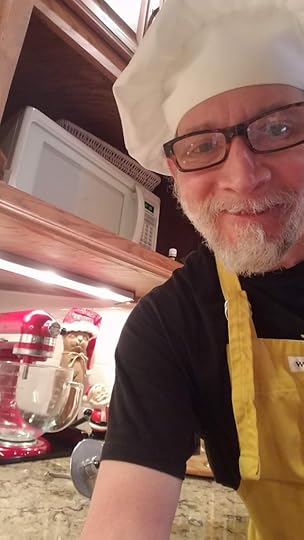
The first thing to do is don’t pay attention to the writers of the past, the ones whose sole existence revolved around writing and creating their larger-than-life personas. Some people feel comfortable establishing and maintaining a schedule. This can be done even in the midst of other life responsibilities. If you are a morning person, you might wake up earlier than you would and write for thirty minutes. Or, you may wait until after dinner and the usual catching up with your spouse or significant other, then forgoing couch potato time or social media surfing to put in some time in the evening.
If you are like me, there are errands and honey-dos on the weekend. Sometimes, I work on something before I go grocery shopping. There might be up to an hour in the late afternoon to get some work done before dinner. Sunday mid to late morning is useful. If my wife has things to do Sunday evening, I take advantage of that time.
I do not stick to a schedule. I can’t. Life is too variable and flexibility is needed. I am fond of keeping notes on scraps of paper, some placed directly on the cover of my laptop as reminders. I need reminders. I use the calendar on my phone for just about everything I need to do. Of course, if there is a technical issue and the synch between mine and my wife’s calendar goes haywire and I need to spend time trying to figure out technology…well, you get my point.
While retirement is a little over three years away and available hours will become more readily apparent, I live in the here and now. There are responsibilities that call me away from the keyboard, limit my social media interactions, and cause a strain trying to maintain a balance between that which I would like to do and that which I need to do. It is all nothing more than a question of time and the judicious use of it.
Oh, to be sitting in a café in Paris in the 1920’s
February 24, 2024
A NEW KITCHEN, PART 2
Let’s talk about writing a story or a novel in terms of getting that new kitchen you read me rave about recently. A devoted cook needs the tools of their trade. So, too, the writer. There is the environment. I already had a dream office after moving into the new house. A non-conforming room in the basement, basically a bedroom without windows, large enough to house the majority of books we owned, close enough to the internet router, and still with plenty of space for a morning workout. The space is the start, where you settle in to begin either your literary or culinary journey.
Then there are your tools. Maybe a stand mixer, mixing bowls, loaf pans. Down in the basement, beside the computer, research books, spare note pads for those scribbles you make, manilla folders. You’ve got your space and the items you need to put together what will eventually be a special creation.
Then you realize you’re not organized. Something is amiss. Perhaps everything. The kitchen and the office are not the same as the former kitchen and office. The feeling of knowing exactly where everything is and where you fit within the realm of those new rooms is not quite there. Yet.
Rearranging a kitchen, determining where to put the cups and bowls and plates and utensils is exactly the same as coming up with the structure of the story. It’s one thing to know you are baking a rosemary and cheddar boule or writing an historical crime novel. This is the end result. This is what you have determined you will create.
But the plot and the outline are secondary to the notion of how everything will be put together. In the kitchen you rely on a recipe. But you can never be exact and precise with the measurements. There is a plot point, maybe an unexpected twist that will arise as you actually begin writing, something so viable and deliciously fun that it must be included. Subsequently, you need to adjust.
There is no assembly line for baking or cooking and certainly not for writing. You may have a routine. You may get into a rhythm. But there are many facets of each, as well as the intrusion of life into your creative endeavors, that it is vitally necessary to adapt and adjust.
You will likely find your routine is more open than you realize or thought you could accept. Trying new ways of creating will foster more intellectual growth than simply standing pat on old ground. These have all become challenges to me in ways I never thought they would. Nevertheless, I enjoy these acts too much to simply acquiesce to frustration.
February 11, 2024
A NEW KITCHEN
I’m going to make a statement that might seem a little confusing or strange. Those of you who know me personally may understand. For the rest of you, an explanation will follow.
I CAN’T REALLY GET BACK INTO MY WRITING UNTIL I GET A NEW KITCHEN.
All right, let’s break this thing down. Mid-September of 2023, I’m just about finishing up the fourth draft of the second book of the Wichita Chronicles. I figure I have enough time to get this submitted to my publisher, The Wild Rose Press, before they go into their holiday shutdown. I hadn’t anticipated my wife sending me a link on Zillow to a house.
We had been looking for about eighteen months, you know, hoping to downsize from a 2500 sq ft Victorian home in Historic Midtown here in Wichita, KS. We are in our 60’s, moving steadily toward retirement, and, well, better sooner than later. So, eighteen months of nothing turns into three months on a roller coaster. Closing, then getting an offer on our old house, then closing, then the holidays. Exhaustion, physically and mentally and emotionally.
Now, it is 2024. We’re unpacking, setting up all the rooms. I’ve got a basement office that also houses about 75% of all of our books as well as enough space to work out in. My wife has gone from a Craft Room to a She Shed with vast amounts of comfort for her personal and spiritual needs. She put up several wall hangings. The cats are adapting magnificently. Everything is great.
Except I’ve gone from a 27 cu ft refrigerator to 17 cu ft one; from a dial fuel Wolf range with a gas cooktop to a coil range with only three burners working; a dishwasher that can take up to four and a half minutes to start on account of it dying; and a vent hood whose light doesn’t work. This hasn’t stopped me from cooking, baking bread, and making sausages (which you are all aware of because I have often posted about such things).

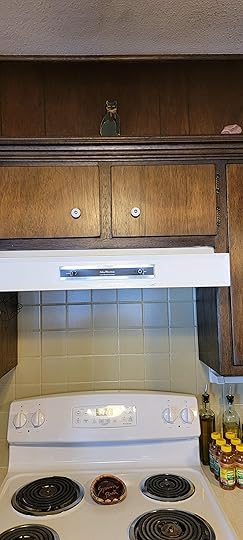

My two prominent forms of creative expression is writing and cooking. I have done both independently of each other. Somehow, they have become intricately entwined. The notion of taking disparate items and blending them to a cohesive whole is invigorating to me. Yet, just making dinner or lunches for work or baking bread is not enough.
Well, that is all changing. The appliances have been ordered and will have been installed by the time you read this. Rather than going through a renovation, we are using a local company for a transformation to include countertops, cabinets, and a new sink and faucet. By the second week of February, I will have my new kitchen.
No, I haven’t stopped writing. Heck, there’s this blog post. (I also started on Book Three of the Wichita Chronicles, just because.) But, just as my office is a new level of comfort than the old house, the kitchen will be as well. It is in these new environs that I can proceed forward in all my future adventures.
Now, if only retirement can hurry up and get here!
ADDENDUM (AFTER THE FACT): As of today, right now, this very moment, the appliances are in and operational. The transformation is 95% complete (a couple of cabinet doors need to be reordered). The electrician will be in soon to finish installing the task lighting. EVERYTHING that had been removed from EVERY cabinet, shelf, and drawer has been put back (and in some cases not in the original place). I may have lost some space. What I have GAINED is a brighter, more modern, and more functional kitchen.
These are the plusses and minuses of life. The Rolling Stones famously declared that you can’t always get what you want. BUT you might find you get what you need. And, well, my needs have been met. Certainly, there are further things to be done to make this house truly our home.
For the time being (after this weekend which marks the period of insanity from Thanksgiving to the Super Bowl), I will be able to return to the fully creative processes which sustain me. The work is still ongoing but I’m closer to where I need to be.
And STILL waiting on retirement….
February 7, 2024
THE ONES LEFT BEHIND
All the way back in July 2022, I did a post entitled “W.I.P. (OR, WHAT HAVE I GOTTEN MYSELF INTO)”. It was an honest identification of a variety of writing projects designed to motivate me by (“putting it out there”, holding myself accountable to keep pursuing the craft with these various endeavors. A scant three months later I posted a W.I.P. UPDATE as there had been some progress and I was rather proud.
W.I.P. – THE ONGOING SAGA from May 2023 identified what was happening based on getting a contract for what turned to be THE DAY OF CALAMITY, VOLUME 1 OF THE WICHITA CHRONICLES. Other work had slowed down as I was in full edit mode, also desperately working on Volume 2. I did some brief outlining of Volume 3.
And then, well, the house moving, the house selling, the holidays, right up until now with a minor kitchen renovation. I had just completed the fourth draft of Volume 2 when ALL of this started. In the middle of it was the book release. I knew I had done enough on the second book to hold off but was so desperate to “get to work” after the first of the year that I started the third book.
But what of the rest of those interesting and intriguing projects? The stand-alone pulp novel. The rewrite in a different time period of a previously released contemporary crime fiction. Another one-act play. Re-doing old works because I now had a better handle on them and more appreciation for the craft.
All of them became sands in a broken hourglass, drifting into the wind, falling behind me, sadly left alone but not forgotten. It seems almost ill-mannered to use other works as motivational tools, telling them (so to speak) that they are just as important as the BIG books and they have significance as well, only to drop them because, well, I was too darn busy.
Writers often speak of their works as children. Wasn’t it Faulkner that said “In writing, you must kill all your darlings”? While he may have been referencing individual works and the editing process within them, it can’t go unnoticed that we take there pieces personally, deeply to heart.
Well, my darlings, I am simply on a diet. Constrained by time and other responsibilities, I must temporarily sacrifice your coming-into-life and the efforts to do so. This is a passing situation based on major transitions in the life of a sixty-one-year-old man who is taking steps toward retirement. Soon, all too soon, we shall all be together again.
February 3, 2024
JURY DUTY, PART 2
Disclosure: While these posts may have been written during the process, they are not being posted until after completion of the case. Additionally, due to privacy issues, I will not be discussing the specifics of the case.
“I’m making a sandwich.” That was the first thought I had when I got home from the first day. No, not because I was hungry (which I was) but because I knew I needed something more than trail mix, carrots, and an apple to get through a day of a jury trial.
This is not supposed to be “fun.” It’s really NOT like television or the movies. This is an honor, a privilege, a grave responsibility, as well as (let’s face it) an opportunity for an author of crime fiction to get a true sense of the inner workings of the judicial system. Plus, if I blow this off, I’ll be in contempt of court and REALLY get to see the inner workings.
The morning of the first day of the trial, while pulling out of my garage, the gravity of the situation full shines on me. Along with 11 other people, I will be deciding a man’s fate. This is not like an employer firing you from a job or the end of a relationship. This might have repercussions for one individual and his family, friends, co-workers…everybody he knows or has known. This is NOT to be taken lightly.
I arrive before the 8:45 am requested time by the judge. I’m the first to enter the Jury Room. It holds a table, thirteen chairs, a sideboard with a coffeemaker, a mini fridge, and a door that goes to two small bathrooms. The chairs are comfortable (more so than the wooden benches in the courtroom itself) but this is not supposed to be a place of comfort.
Other jurors enter slowly. There is a nervous silence. People look at their phones or try to read. Some are looking around, not directly at anyone, perhaps in contemplation. It is approaching 9:30 am and we start to break that silence. The clerk says they are running behind but we should start shortly. More chit chat, light humor to break the tension, personal (but not too personal) anecdotes. Speculation. Uncertainty. Fatigue. Boredom. Then we get called in.
The judge is apologetic but thankful. He advises the defendant has accepted a plea agreement. Our services will not be required and we will not be sworn in. He allows us to ask questions with general regard to the case or about the system and process as a whole. It is informative considering it is not an aspect of life that is readily viewable, unless you choose to attend a trial.
There is no frustration, nor is there a sense of relief. There is a dull vagueness. Did the jury that was empaneled concern the defendant enough to alter the course of his defense? Did he fully accept his guilt or simply realized the options more clearly? This is something I will never have an opportunity to find out. Unlike the official record once the sentencing has been completed, the inner workings of the mind of a defendant are privy only to those within the system.
We were no longer required to be put back into the jury pool as all other trials scheduled had sufficient people to choose from. I was left with no recourse but to return to work. Life, such as it is, returned to normal, whatever that means. But for a day and a half, I got to experience THE WAY THINGS ARE when our law enforcement and judicial system operates.
I gained something more than factual information for use as a writer of historical crime fiction. I learned just a little bit more about myself. It is only at times like this, when matters of importance, real importance, are presented to you, that a person can understand their own inner workings.
January 31, 2024
JURY DUTY, PART 1
Disclosure: While these posts may have been written during the process, they are not being posted until after completion of the case. Additionally, due to privacy issues, I will not be discussing the specifics of the case.
I’m 61. I write crime fiction. This was the first time I was empaneled on a jury.
I’ve gotten a summons before. I can’t refer to it as a new fandangled electronic automated system because prior to that I had never received one. The process was the same as recently: Go online to take a survey. (This is to determine if you are a U.S. citizen living within the jurisdiction of the court who sent the summons; whether you had not been convicted of a felony within the last ten years; whether you speak English; and whether you are a breastfeeding mother.) Then on the Friday prior to the gathering of the jury pool, you call an automated number. Last time, my group wasn’t called. This time it was.
I immediately let my employer know when I RECEIVED the summons and then again when it was an automated thumbs up. I had to figure the boredom and food factor in. So, I brought with me Raymond Chandler’s “The Simple Art of Murder”, some trail mix and carrots, an apple, and a refillable bottle of water. This did NOT prepare me for my day.
Just like the doctor’s office, you have your appointment, wait to be called, and then wait for the doctor. Check-in was to be between 8 and 8:30. I checked in and sat. About 45 minutes later, my judge’s group was called. Took three elevator loads to get us up to the 10th floor.
Another 45 minutes later or so (after the judge initially introduced himself, thanked us, and briefly explained the process), we were all assigned specific seats from which the attorneys were going to conduct voir dire, which in Latin means “to speak the truth” and is the process by which prospective jurors are questioned to determine if they are viable for the case.
The nature of the case, not the specific charges, was enunciated by the district attorney. The defendant was sitting right there at the defendant’s table. There was close to fifty of us. The judge asked his questions first. A couple of people were immediately excused for cause, had to go back downstairs to the jury pool room to go to ANOTHER judge’s courtroom, before the district attorney started her questions and excused a couple of people of her own.
11:30 am. One guy asking to go to the bathroom resulted in an hour and a half lunch break. Lunch? Yeah, right, an apple and some trail mix. No way I was going to spend good money for cheap food in the lobby café or go out to get something better and then go through security again.
We didn’t start right up at 1pm. More like 1:30. The defense attorney starts in on her questions. Now, some people were asked questions multiple times. Between the two attorneys, I only got asked three questions. The district attorney, referencing my questionnaire sheet, mentioned that I was in customer service, then asked what my spouse did. I responded that she was admin to the president of a logistics and warehouse company. Follow-up question was whether she had done that type of job most of her life. I responded “Yes, even at home.” The punchline was the district attorney referring to me as a CEO.
Later, in going through a series of questions regarding ability to discern credibility, the district attorney again referenced my customer service experience as likely a useful skill set, but I added in that I was a published author as well. The genre questioned was next: Historical Crime Fiction, and then a brief discussion of my research. I passively indicated that I wasn’t there to market, at which point the district attorney said it was a good opportunity. (And, yes, I mentioned my non-legal name and where I could be found on Amazon.). Finally, the question by the defense attorney was in regard to my ability to NOT require the defendant to testify which is his Constitutional right. I answered the only thing I needed was to sit and listen to everything the attorney’s DID present and make a judgment from there.
3:30pm. The judge gives us a thirty-minute break after which the selection would be announced. Did I expect anything? Did I suspect anything? I was too caught up in the moment to even consider. However, when the judge is reading the name of the people in your row who are dismissed and he DOESN’T say your name, well, you know the answer.
January 20, 2024
HAMMETT AND CHANDLER
I have often said I was inspired by the hard-boiled fiction of Dashiell Hammett and Raymond Chandler. My preferences also run toward the dark fiction of Cornell Woolrich, the scatological explorations of James Ellroy, and the pure pulp of Jim Thompson. Those five authors makes up a large selection of my home library.
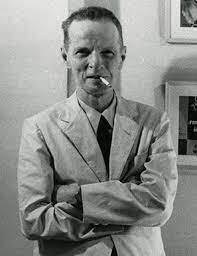 Cornell Woolrich
Cornell Woolrich
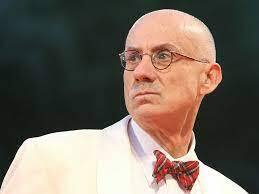 James Ellroy
James Ellroy
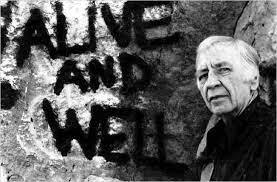 Jim Thompson
Jim ThompsonBut when considering early hard-boiled fiction, the roots of which lie largely with Hammett and Chandler, it is important to make a distinction between their styles and influences. Chandler gave Hammett the highest praise when he wrote:
“Hammett wrote at first (and almost to the end) for people with a sharp, aggressive attitude to life. They were not afraid of the seamy side of things; they lived there. Violence did not dismay them; it was right down their street. Hammett gave murder back to the kind of people that commit it for reasons, not just to provide a corpse; and with the means at hand, not hand-wrought dueling pistols, curare and tropical fish. He put these people down on paper as they were, and he made them talk and think in the language they customarily used for these purposes”
The thing to consider is the approach each took toward the development of their respective styles. Hammett worked for the Pinkerton National Detective Agency from the age of 21 until he was 28. He was involved in enough work for the agency to know how things operated. This allowed him, as Chandler stated, to give murder back to the people who really committed it.
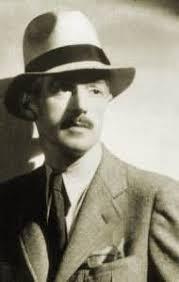 Dashiell Hammett
Dashiell HammettChandler, on the other hand, was born in the United States but educated and raised in England. He developed a refined sense of life while undermining his professional success as the vice president of an oil syndicate through his alcoholism.
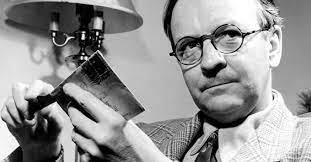 Raymond Chandler
Raymond ChandlerThe Conitnental Op, featured in many of Hammett’s short stories as well as the main character in “Red Harvest” is a weary veteran of the detective trade who has no compunction about setting opposing sides against each other. Philip Marlowe, Chandler’s primary protagonist, references clothes and flowers and architecture like a member of high society would, even though he wouldn’t dare become one of its members. Someone once said Chandler wrote the character he always wanted to be. Perhaps that is true of most writers.
The differences are stark and obvious once you start reading their respective works. They were in the forefront of a new and uniquely American kind of fiction, one that can be compared in many ways to anything literary of the time period. The focus on their craft is what earns them this distinction.
So, it is possible to view both as inspirational in terms of accepting and continuing within this genre. It is necessary, of course, to establish one’s own voice. Therefore, in creating Harold Bergman, the main character in “The Day of Calamity, Volume One of the Wichita Chronicles”, we have a character who has a similar background to Hammett’s Op (i.e. former policeman) while espousing the intellectualism of Marlowe via discussion of Old Testament passages. And, perhaps, Harold Bergman is the type of character I wanted to be.
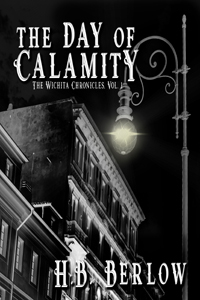
The differences are apparent. Yet, the structure and tone remain embedded in a classic style.
December 31, 2023
ISN’T THIS WHAT YOU’RE SUPPOSED TO DO?
You’re not going to catch me making any New Year’s resolutions. That’s for another age group. Writing goals? Yeah, I have those. Continuing to be the best spouse I can be for a loving wife? That’s ongoing.
I guess this is more of an appropriate time for reflection. And in this particular case, this year did not evolve entirely on its own. Rather, it was the end result of long periods of work and effort.
I originally came up with the idea for The Day of Calamity while sitting in a hot tub in April of 2019. But first I had to finish the Ark City Confidential Chronicles series, then came Covid, followed by a period of uncertainty. I pitched this new book in 2022, worked diligently with my editor before a final galley was created, and then had to wait from May 2023 until November 29 for the release date. There is a lot to be said for patience being a virtue.
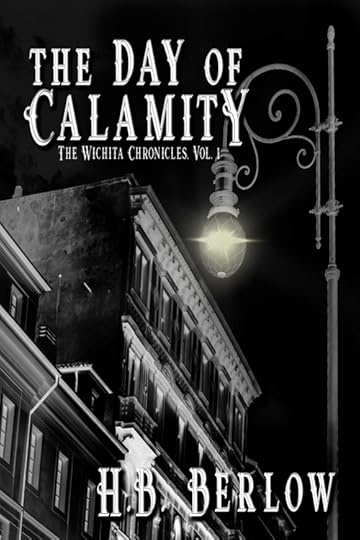
As of September 2023, my wife and I had been looking to downsize for a full eighteen months. We previously lived in a 2500+ square foot Victorian home in midtown Wichita which we KNEW we wouldn’t be able to maintain physically or financial as we made plans for retirement. High interest rates, inventory shortages, and a plethora of other issues made our search initially appear desperate. The only thing we had to count on was that our home was paid for and we didn’t have to move until everything was right.
Then, a timeline that seems like the 4 x 100-meter race at the Olympics:
September 18 – We go see a house. It seems right. We make an offer.
October 19 – Closing day, followed by three gruesome days of moving. (Well, let’s call it primary moving. There was STILL a lot of stuff left.)
November – We get an offer on our house, a scant 10 minutes before the realtor was going to list it.
December 13 – Closing on a house that was our home for 25 years.
All of this stuff happened, ended, finished in 2023. The seeds, however, were planted earlier. At this very same time last year, I was editing a book, trying to determine its value compared to those that came before, haphazardly plotting out a marketing scheme. My wife and I perused Zillow and Trulia, had deep discussions over Friday night happy hours at home, thought and speculated and strained our brains.
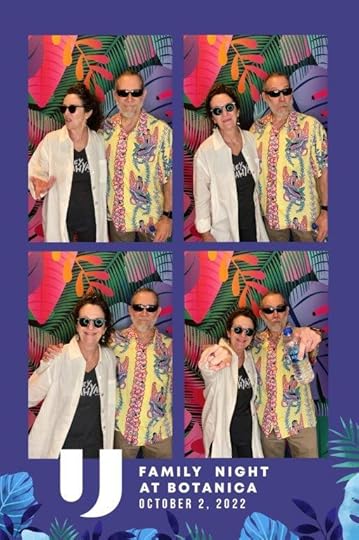
As time goes by (or as I get older – take your pick!), I understand that life is not based on simply a calendar year. Everything you start in January will NOT come to a resolution by December. Every single day, you process both mentally and physically what happened on that day and how it has some relevance for that abstract thing called Tomorrow. The dough has to rise before you bake the bread. When it comes to smoking meat, they always say “Low and slow.” You do and then you wait.
So, I’m putting this all down and declaring it as a standard that many people seem to follow, the thing you’re supposed to do. No, I am not declaring any resolutions. I am, however, continuing to put one foot in front of the other and moving forward. That’s the place I’d rather be anyway.




